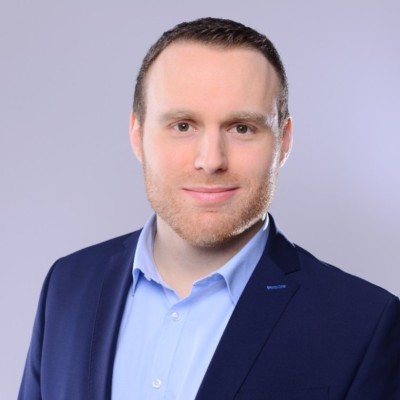
New in the DGM Team: Dipl.-Ing. Sebastian Slawik
Since March 2023, Sebastian Slawik has been supporting DGM e.V. with his professional expertise in the entire field of materials science and materials engineering as well as in event organisation. In the interview, we introduce you to our new colleague and team player.
Sebastian, what motivated you to join the DGM team?
The DGM has been with me since I studied materials science and engineering at Saarland University. It's the most renowned German society in this field. How can young people get involved in the DGM? With this question in mind, I attended the first DGM Young Professionals Forum in Cologne in 2012. A motivating experience! In the same year, we founded the first Young DGM local group in Saarbrücken and actively supported the students with subject-related excursions, lectures, workshops, and other events. These activities are still very relevant today. During my doctoral studies at the Chair of Functional Materials (Prof. Mücklich), I came to appreciate the DGM network through participation in important conferences such as MSE and Werkstoffwoche, as well as in technical committees and working groups, but I also actively supported it, e.g., by organizing the Regionalforum Saar.
It is exciting for me to be able to further establish the DGM with its more than 100 years of tradition, forward-looking expertise, and presence in the field of MatWerk, and to now play an even more active role in shaping its potential as a link between industry and science. Overall, I am delighted to be able to support DGM technically and contribute new ideas from my professional experience, including "new perspectives".
I will also be able to maintain a small research activity at the University of the Saarland. I believe that this will also help to keep my DGM activities more "up to date".
Which tasks and areas of expertise are you responsible for at the DGM e.V.?
I am currently supervising two projects in which the DGM is directly involved in the respective consortium: the CLASCO project, an EU project on surface functionalization, and the NFDI-MatWerk initiative, a DFG-funded project on research data infrastructure. I also remain active in the organization of the Regionalforum Saar, which I co-founded during my doctoral studies. In addition, I support the DGM in other technical and organizational tasks and am happy to be your contact person for technical matters.
How do you see the future of materials science, what developments and challenges do you expect in this field?
The term materials science is already in the name of the DGM. It reflects the long tradition of the field, which was initially limited to metals. The DGM eventually also coined the term Materials Science and Materials Engineering (MatWerk), which is used today and includes all classes of materials. For me, this field of research and development is the basis for most innovations that can/should be called such (e.g. battery).
The topic of sustainability will keep almost every materials engineer busy for a long time to come. Other important development topics, which basically all fall under this umbrella, are digitalization, recycling, but also new material developments and functionalizations, especially for the socially relevant areas of energy and mobility, but also to some extent in medicine. I would like MatWerk to support as many innovations as possible, thus increasing their potential or even making them possible in the first place. And a DGM that supports this in one way or another.
What is your focus on the CLASCO-project?
The goal of the CLASCO-project is to develop a laser machine that, for the first time, can smooth and functionalize the surfaces of complex 3D printed parts. This will be another significant step forward for additive manufacturing. In the spirit of the DGM, I am here to support the project and its presentation and development of results in terms of content as well as communication within and outside the consortium. We will also develop the first business ideas to enable a direct transition to the market in cooperation with the Steinbeis-Europa-Zentrum. On April 18 2023, I attended the first project meeting in Dresden and got to know all the members of the consortium, which includes 15 nationalities. I find the latter in particular very interesting and instructive. I am very excited about the further development of the project and I am looking forward to working with them.
We extend a warm welcome to Sebastian. We are looking forward to a successful collaboration.
![[Translate to English:]](/fileadmin/_processed_/f/0/csm_logodgm-4_b2722eeace.png)
![[Translate to English:]](/fileadmin/user_upload/logodgm-4.png)